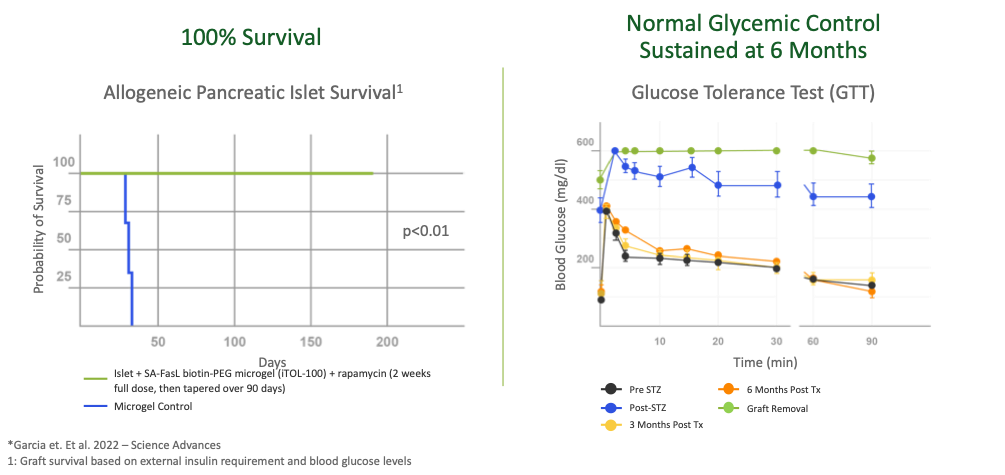iTOL-102
A Potential Stem Cell-Derived Cure for Type 1 Diabetes
iTOL-102 is our lead commercial program being developed as a potential cure for Type 1 Diabetes. Using our proprietary SA-FasL biotin-PEG microgel platform, iTOL-100, which acts to generate localized immune tolerance, allogeneic stem cell-derived pancreatic islets will be implanted in the body. These stem cells are potentially capable of secreting insulin in response to sugar intake, similar to how native pancreatic islet cells behave. Additionally, the use of stem cell-derived pancreatic islets provides a potentially inexhaustible supply of insulin-producing cells.
We have initiated preclinical studies with iTOL-102, utilizing different stem cell sources, as we advance towards our first-in-human studies.
Compelling Results Demonstrated in NHP Study Published in Science Advances with iTOL-101
iTOL-101 demonstrated long-term function with control of blood glucose levels and restoration of insulin secretion without the use of chronic immune suppression.

How iTOL-100 is Designed to Work
In a pre-clinical non-human primate study of our lead program using allogeneic pancreatic islet cells and iTOL-100, the implanted pancreatic islets were shown to act similar to native islets, by secreting C-peptide and insulin in response to sugar intake. The study included early treatment with an immunosuppressive drug, sirolimus (full dose for two weeks and then tapering off over 90 days). The duration of the study was six months and allowed the researchers to confirm the viability of the implanted pancreatic islets through C-peptide and insulin levels at 3 and 6 months in the fasted and stimulated with glucose states. At the conclusion of the study, the implanted tissue was removed from the animals confirming the implanted pancreatic islets were responsible for the C-peptide and insulin levels in the fasting and stimulated with glucose states.

Potential to facilitate
functional engraftment while reducing cell rejection

Potential to eliminate the need for sustained immunosuppressants and antiviral, antifungal and antibacterial drugs

Multiple partnering opportunities for
stem cell-derived islets
Even with Insulin Treatment, There Remains a Significant Unmet Need in Type 1 Diabetes
Type 1 Diabetes is a chronic condition in which the pancreas produces little or no insulin. People with brittle diabetes frequently experience large swings in blood sugar that can quickly move from too high to too low or vice versa. Severely low blood sugar, called hypoglycemia, can cause sudden and unexpected seizures, coma, heart attacks, and even death.
26 million
patients worldwide
1.6 million
patients in the U.S.
70K – 100K
very severe uncontrolled
type 1 diabetes; “brittle”²
Poor Glucose Control Has Long Term Consequences1
%
Retinopathy at 18 years
(45% are severe)
%
Neuropathy
at 18 years
%
Nephropathy
at 18 years
1: Insulin independence rate from 2007-2010 in 677 islet transplants from Schuetz C, Markmann JF. Islet cell transplant: Update on current clinical trials. Curr Transplant Rep. 2016;3(3):254-263: 2: Vanstone, M. Patient Perspectives on Quality of Life With Uncontrolled Type 1 Diabetes Mellitus: A Systematic Review and Qualitative Meta-synthesis. Ont Health Technol Assess Ser., 15(17), 1–29.
Our Technology
Scientific Publications
Our Team

